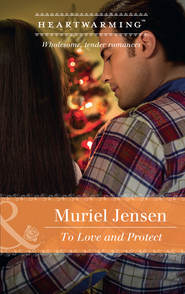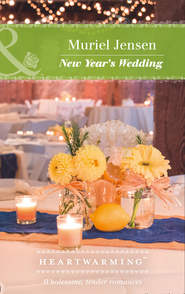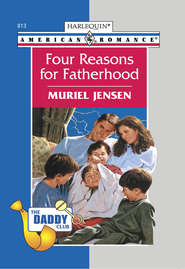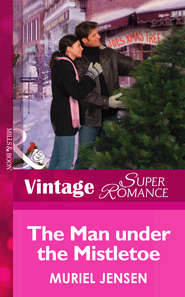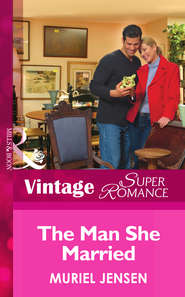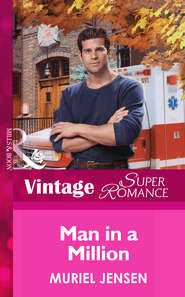По всем вопросам обращайтесь на: info@litportal.ru
(©) 2003-2025.
✖
Man With A Miracle
Автор
Год написания книги
2019
Настройки чтения
Размер шрифта
Высота строк
Поля
“I told Brian you were coming,” Cam said, shamelessly forcing his hand. “The kid’s looking forward to seeing you.”
“And Mike was looking forward to talking to you about the Sox,” Bart told him. “Nobody else has the stats at his fingertips like you do.”
Hank slipped out of the booth. “Jackie wants you to bring salad. We’ll expect you at two o’clock.”
He conceded with a nod. “Okay. I’ll be there.”
The group dispersed. Evan bought a refill on his coffee and a few more doughnuts, then went out to the red Jeep the garage had lent him while they replaced the alternator on his van.
He missed his big vehicle. EVAN BRAGA, PAINTING, PART OF WHITCOMB’S WONDERS was now painted in red letters on its side. He felt a certain pride every time he looked at it. He’d managed to pull himself together in a year, and though he still had a lot of issues to deal with, he was making progress. Life was good.
He climbed into the Jeep, grateful to have wheels at all, put the coffee cup in the console, tossed the bag of doughnuts onto the passenger seat and headed for the mill.
His parking spot was around the back, where he and Cam kept an office that also served as a storage shed for tools and equipment. There was a lumpy old love seat in it that Bart and Haley had donated when they bought new furniture, and Evan wanted nothing more than to sit on it, drink his coffee and have another doughnut, before he applied the second coat of paint to the window frames and doors of the accounting office, then wallpapered the women’s bathroom.
Balancing doughnuts, coffee and the new roller handles he’d bought, he unlocked the door and pushed it open.
What he saw shocked him into stillness. He experienced a playback of that moment, a year and a half ago, when he’d opened the gym bag and found bundles of cash.
Only, this moment was potentially more dangerous. He was looking at the business end of the Louisville Slugger he kept on top of the bookshelf. Ready to swing it was a very disheveled young woman in a torn and dusty navy-blue suit and jacket and dress shoes. Dark red hair was piled in a messy bundle atop her head, and she looked pale and obviously terrified.
He assessed her calmly as his old training kicked in. She was average in height and slender, and even with a gun would have posed a negligible threat—if she’d been calm.
But she wasn’t. She looked exhausted, and her red-rimmed blue eyes said more clearly than words that she was on the brink of destruction—her own or someone else’s.
His presence seemed about to push her over the edge.
“Hi,” he said calmly, and stayed right where he was.
HI? BEAZIE DEADHAM thought hysterically. He’d killed her boss and chased her across the commonwealth of Massachusetts, and all he could say when they finally stood face-to-face, was Hi?
She was going to lose it. She could feel it happening. She was shaking so hard she could hear her own teeth chattering.
Things were beginning to reel around her. She’d been up all night with nothing to eat or drink. She’d tried to close her eyes during the four-hour drive in the back of the moving van, but each time, she’d seen her boss’s broken body crumpled on the concrete floor of the parking structure, life ebbing out of him as she ran and knelt beside him. She’d seen the red SUV with the gunman in it rev its motor.
“Beazie,” Gordon had gasped, and clutched her hand. “Evans…” Blood trickled out of the corner of his mouth. “Take it to…Evans. Maple Hill… No police.”
Barely able to hear him, she leaned over him, her ear to his lips.
“No one…else,” he said in a barely audible croak. “Evans…Maple Hill.”
It was only then that she noticed he’d pressed something into her hand: a miniature tape cassette like the kind in an answering machine.
This wasn’t happening to her, she thought in a panic now, dragging herself back to the moment and the man who stood across from her. Although her arms were aching from holding the bat, she didn’t dare lower the weapon. This guy had killed her boss, Gordon Hathaway. Gentle Gordon, the man who’d given her an advance on her paycheck when she’d hired on, because she’d explained she was really broke; who’d given her a bonus when she’d reorganized the filing system; who’d been kind and funny and more of a friend than an employer.
“Do you want to tell me what you’re doing here?” the man asked in a quiet, rumbly voice from across the room. In his large hands were two long poles, a paper bag and a cup of coffee. His white pants and sweatshirt were both covered with flecks of paint in assorted colors, and a red scarf patterned with black moose and bears was wrapped around his neck.
It encouraged her that she could see so clearly, considering the way her eyes burned. Spots had been floating in and out of her vision, but they were gone now. Still, she felt vaguely nauseated.
The man’s hair was dark blond and slightly curly, his eyes brown and calm. He apparently didn’t consider her a threat. Well, she’d show him! Nobody killed people she knew and got away with it.
But what did she do with him, now that she had him at bay? Gordon had said no police. She could only conclude that meant someone in the police department was involved in his death. But did he mean in Boston or in Maple Hill? Oh God.
“You murdered Gordon Hathaway!” she accused sternly, hoping she looked like a controlled woman with a plan, even though she didn’t have one. “Did you think you’d get away with that?”
Those calm brown eyes looked blank, then he blinked and said, “Pardon me?”
“You killed Gordon Hathaway!” she shrieked at him. The spots were back and she was starting to feel as though she was about to explode. All effort to remain calm disintegrated. “And you’ve been after me ever since!”
“Why do you think that?” he asked.
“Because I saw you! I saw your red SUV in the parking garage when that guy leaned out and shot Gordon! I saw you come into my apartment building, looking for me!”
“You didn’t see me.”
“I did! And just now, I watched you pull up here!”
“Look,” he said in that patronizing tone. “I’m just going to put this stuff down, okay?”
“Don’t think I won’t smash you.”
“It’s okay,” he said, easing the poles into the corner near the door.
She watched him as he placed the small bag and cup of coffee on the edge of the desk beside him. He looked up at her and noticed her licking her dry lips. “Are you hungry?” he asked.
He reached slowly for the bag and tossed it to the love seat near where she stood. “There’s a maple bar, a cinnamon twist and a caramel-nut roll in there. Help yourself.”
Without moving her eyes from him, she pointed the bat with one hand and unrolled the top of the bag with the other. She reached inside and withdrew the first thing her fingers touched. It was the maple bar. With a shaky hand she brought it to her mouth and took a large bite.
It tasted like ambrosia.
Fortified by that single bite, she indicated the coffee cup with the bat, which was getting heavy. “Move the coffee to the edge of the desk.”
Certain she had him at least concerned, if not intimidated, she was surprised and dismayed when he grinned.
“Sorry. That’s only my second cup this morning, and I’ve got a big day ahead of me. If you want it, you have to take it from me.”
Beazie figured she must have looked disappointed, because his grin widened and he said, “Oh, all right.” Reaching for a pottery cup on the desk, he poured half of the coffee into it, then held the paper cup out to her. “Here you go.”
She’d never wanted anything more in her life, but she didn’t trust him. Apparently aware of that, he put it on the edge of the desk nearest her and took several steps back.
She put the maple bar down, reached for the cup and took a careful swallow. The coffee was hot, rich and absolutely delicious.
“I’m driving a Jeep on loan from the garage that’s fixing my van,” he said, sitting on the desk and drinking from his pottery cup. “Not an SUV.”
As she lowered her own cup, she felt an instant’s uncertainty.
“Where did this murder take place?” he asked.






